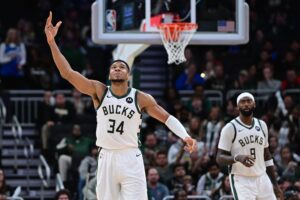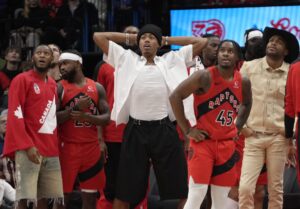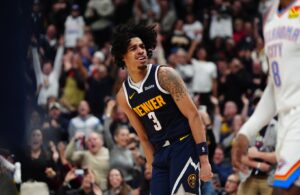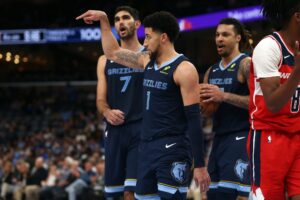Watching the Miami Heat‘s Big Three dismantle piece by piece was the professional version of witnessing the Michigan Wolverines Fab Five fall apart. In that scenario, Chris Webber was the first to go pro. And Michigan replaced him with Dugan Fife and became the “Fab Four Plus Fife.”
At least with Michigan, the end was always in sight. Webber, Jalen Rose, and Juwan Howard were undoubtedly leaving early to turn pro at some point. In Miami, the great illusion was that it seemed as if it never had to end. However, the Miami Heat’s Big Three era ended as unpredictably as it started. LeBron James left a few seasons ago now, but there were still remnants of the Big Three era until recently. Like watching the Fab Five without Webber, seeing Dwyane Wade and Chris Bosh share the court simultaneously brought instant satisfaction and a bit of championship nostalgia. Now, the Heat are about to embark on a season without any of them.
Miami Heat’s Big Three Era Ended as Unpredictably as It Started
For the first time since it came together, the Heat will bear no resemblance to the perennial contenders of yesteryear. There are no innocent parties in the Heat’s demise, only those guilty by association. Here’s a look at how the major players in the show laid the groundwork for its dismantling:
LeBron James
It’s becoming clearer and clearer that LeBron James sees organizational power as a paramount aspect of his legacy. Beyond his on-court greatness, few players in the history of sports have done as much to leverage player importance against front office control. However, his current influence with the Cleveland Cavaliers has become both overstated and a little misunderstood. Whenever the Cavaliers make any type of transaction, it’s common for NBA fans to make the see-what-GM-LeBron-did wisecrack. And for good reason. However, the stagnation in getting J.R. Smith‘s contract done, as well as the difficulties with Tristan Thompson‘s deal last summer, suggests James’ clout within the organization does have limits.
He’s as hands-on as any NBA superstar. That rubs some people the wrong way. But few stars have attempted to do such a thing; James is trying to establish a new norm. Whatever team James plays on needs him far more than he needs the team.
Through it all, though, LeBron James has remained fiercely loyal to those in his inner circle. Making his high school friends his business partners and management group was the ultimate power play. It speaks volumes that even though James turned his back to the Miami Heat, James and Wade’s friendship has remained as strong as ever.
Dwyane Wade
While his skills slowly succumbed to Father Time, Wade still appeared to be on track to stay in Miami for his entire career. James and Bosh played elsewhere before they arrived in South Beach, making Wade the lone lifer out of the three by default. However, Wade sacrificed money year after year in order to allow the team’s front office to keep guys (Udonis Haslem). Or to keep bringing in reinforcements (Shane Battier, Mike Miller, Ray Allen, among others).
Wade’s sacrifices grew into frustrations, however. Season after season, the order of the Heat’s maneuvers suggested that they kept telling Wade “let us take care of this other thing, then we’ll take care of you.” To his credit, Wade complied. Now 34, Wade felt compelled to call their bluff. He began to believe that maybe the Heat never would get around to giving him his legacy contract, so he bolted to a place that would. It still seems as if Wade begrudgingly left. But his actions made clear where his relationship with the Heat’s management was at in the days before his departure. Even if he was twisting his own arm to leave, leaving made it clear that he believed the Heat were just telling him what he wanted to hear. They ran out of goodwill with him, and now he’s playing for the Chicago Bulls.
Chris Bosh
From every angle, the Bosh scenario makes total sense, yet seems simultaneously backwards. Normally it’s the team rushing their star back out onto the court. That way, his play (even if hampered) would justify the number on his paycheck. And it’s usually the player who wants to take his time, looking out for the long-term ramifications of playing while limited. Here, it was the Heat who repeatedly kept him in street clothes. While he clamored for second, third, fourth opinions from specialist after specialist, waiting for one to give him the okay to suit up, the Heat forced him to sit.
Bosh has made this messier than it probably needed to be. By going public, Bosh turned an unfortunate situation into a me-against-them war of words. If only we could know what went through Pat Riley‘s head when he was informed that Bosh posted a video online declaring he would play again with … wait for it … LeBron James’ head henchman Maverick Carter! Speaking of Riley:
Pat Riley
Concerning the Big Three in Miami, Riley apparently did not realize how fragile the situation was. He was blindsided when James returned to Cleveland; he let the franchise’s relationship with Wade slowly sour. And his silence made the Bosh case slightly more awkward. Where we are now probably is beyond any worst-case scenario Riley could have ever envisioned. Pat Riley is not used to players challenging his authority. Let alone neglected. Each in his own way, the Miami Heat’s Big Three all rejected some aspect of Riley’s leadership in South Beach. When things end this badly, it’s not unreasonable to say it was probably never as good as it appeared at its apex. Riley worked hard to bring the Big Three together, but probably created tension by taking it for granted towards the end of the run.
What Brought Them Together Tore Them Apart
When the Miami Heat’s Big Three joined forces, it was a big middle finger to everyone who said they wouldn’t dare play together. James, Wade, and Bosh leveraged whatever they could in order to empower themselves. They circumvented the salary cap, appeared to make backroom deals to get other players on board, and worked in unison as their own collective general manager. And used Pat Riley to do their dirty work. While the Miami Heat’s Big Three did sacrifice millions, their presence forced owner Micky Arison to spend millions of his own money on luxury tax expenses.
LeBron James left because he wanted to. Dwyane Wade left because he felt he couldn’t stay. Chris Bosh left because he had to. Pat Riley was left to pick up the pieces.
It all happened so suddenly. And it all went away equally abruptly. In hindsight, it is clear that James, Wade, and Bosh came together to empower themselves. But one by one, each was forced to look outside the Heat organization for self preservation. It will be remembered as one of the most important four-year runs of any franchise in NBA history. It needed context to be properly understood, and context only comes after the fact. It’s a shame it came and went so fast. James, Wade, Bosh, and Riley all needed each other to make it work. It was such a bright and powerful shooting star in the NBA sky that it was bound to burst. And in the same spectacular way in came together, it came to an equally stunning end.
Main Photo






